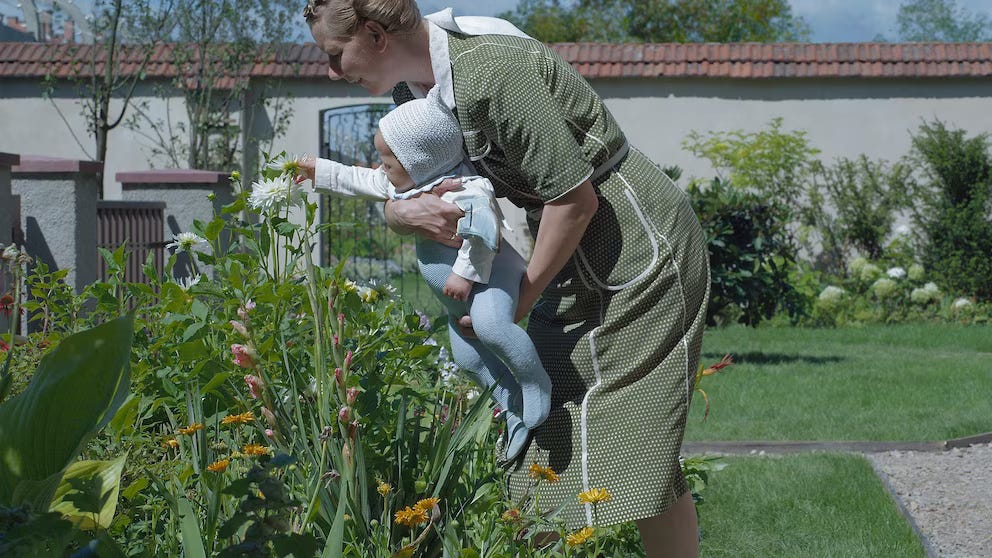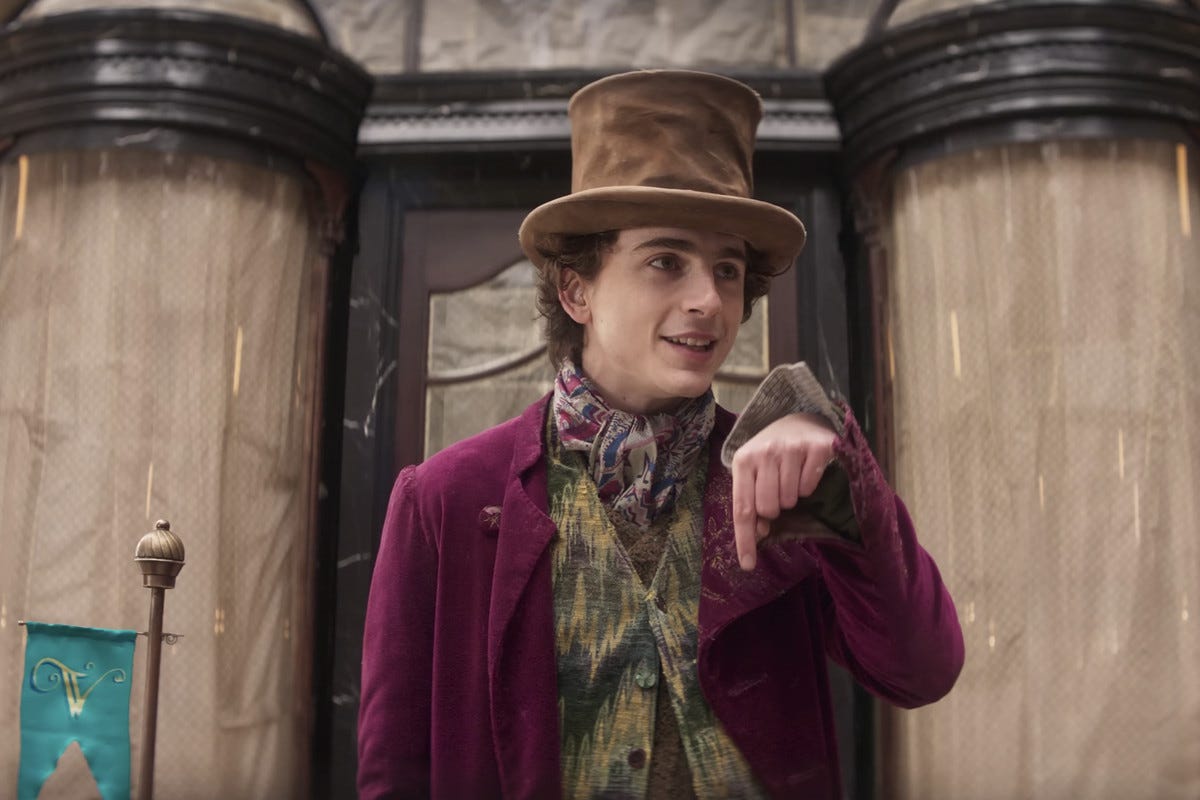The Zone of Interest
Dir. Jonathan Glazer
105 min.
Early in The Zone of Interest, Rudolf Höss, the commandant of Auschwitz and one of the most efficient mass murderers of the 20th century, is out fishing in one of the beautiful streams that cut through the Polish countryside. Two of his children have joined in their bathing clothes, completing this Edenic scene that the Hösses have labored to achieve. But as Rudolf wades into the water, he steps on a skull fragment and other pieces of human detritus that has been brought through on the current. He hastily rushes the children away without giving them a reason why their recreation time is ending so abruptly. He is being a good parent at this moment, protecting them from horrors they’re too young to process. Never mind that he’s the one who’s manufacturing them.
That cognitive dissonance is the prevailing tone of Jonathan Glazer’s chilling, astonishingly audacious take on the Holocaust drama, which takes place at Auschwitz without spending so much as a moment inside its walls. And while we never again see evidence of Rudolf’s war crimes presented quite so bluntly, the image of that stream sticks in the mind as the sounds and intangible aura of evil seeps into the family estate like poison in the groundwater. It takes a special filmmaker like Glazer to create an ambience as comprehensively unsettling as the one in The Zone of Interest, which feels at times like an extension of his last film, Under the Skin, in depicting a pitiless alien’s view of humanity. The difference is that the alien in the earlier film is capable of change.
Also like Under the Skin, Glazer has taken a free hand in adapting a novel, plucking what he needs from Martin Amis’ 2014 book and discarding most of it, as if he just required the seed of an idea to grow something new in his head. As his wife Hedwig (Sandra Hüller) and a staff of Jewish servants tend to the house and the flourishing “paradise garden” that buttresses the camp wall, Rudolf (Christian Friedel) has the shortest imaginable commute to work. He hops on his horse and trots through the gates to an immense collection of buildings, from which we hear the intermittent pop of random executions and see the ominous plumes of smokestacks. Rudolf and Hedwig are proud of the lives they’ve built for themselves and their children, and the only real strain in their marriage is when a restructuring of Nazi leadership threatens to move them away.
The Zone of Interest unfolds in a kind of pitched mundanity, as Glazer patiently evokes the Hösses’s strained efforts to enforce day-to-day normalcy in an environment that’s anything but. Yet there are many small moments like that fishing scene that puncture small holes in the bubble they’ve constructed around themselves. From their separate beds, Hedwig daydreams wistfully about going back to a spa getaway she remembers fondly. When her mother comes to visit, Hedwig impresses her with all the work she’s done to the property and sets her up in a sunny, well-appointed guest room, but the older woman isn’t used to living in a place like this. The commotion behind the wall hasn’t been reduced to white noise for her yet.
Perhaps it hasn’t for the Hösses, either, despite their ideological fervor and collective talent for denial. Glazer isn’t keen to show any signs of humanity from either of them, however, save for one brief, violent convulsion from Rudolf’s withered soul. The bourgeois lifestyle the Hösses attempt at home feels supported by the glimpses Glazer gives us of Rudolf at work, where he’s an ambitious, competent go-getter whose only real fault is a clumsiness with office politics. During the window of time depicted in the film, he’s having to work hard to defend his peerless record for efficient killing as his post at Auschwitz is under threat.
Set to another unconventional score by Mica Levi, who contributes to its tonal uniqueness, The Zone of Interest is a masterpiece of offscreen space, trapping the audience with the Hösses as the sound design teases the unimaginable. The ethics of depicting the Holocaust on screen have been much-debated and the debate certainly doesn’t end here, despite (and perhaps because of) the indirectness with which Glazer addresses the genocide. But this is a thoughtful and serious film that’s willing to stare into the abyss and bring something of value out of it. It teases visceral horror from the mind’s eye. — Scott Tobias
The Zone of Interest opens in New York and L.A. tomorrow. It will roll out to other cities in the coming weeks.
Wonka
Dir. Paul King
116 min.
It’s tempting to give Wonka a pass merely for pulling it off. The trouble is, “it” is several unappealing things at once: 1. A prequel to Roald Dahl’s Charlie and the Chocolate Factory, detailing the humble beginnings of the eccentric chocolatier and his whimsical confections. 2. A valuable piece of IP for Warner Brothers and its embattled leader David Zazlov, who lacks the imagination and will to try something new. 3. The start of a new Wonka franchise, presumably ending right around the time Charlie’s grandparents retire to the same bed together.
And so, great, Wonka counts as the sort of qualified success that attends modern blockbusters that don’t completely shit the bed. It looks good. It moves along smoothly. Timothée Chalamet acquits himself fine in a role immortalized by Gene Wilder and diminished by Johnny Depp. Yet it falls into the trap of many prequels that have no reason to exist beyond fluffing the corporate ledger: What could be interesting about this origin story? The flashbacks that Tim Burton inserted into his 2005 film accomplished little more than reinforcing the idea that Willy Wonka was a Tim Burton character, an alienated and misunderstood weirdo with a special creative vision. This new Wonka takes the edge off completely, painting him as a cheery, penniless underdog with a dream.
Perhaps Paul King, who co-wrote and directed Wonka, will have multiple sequels to track his hero’s evolution into a reclusive misanthrope who delights in the miseries of spoiled children, but that’s quite a distance from the indefatigable young optimist Chalamet plays here. In an unnamed European city that more or less resembles Paris, Wonka arrives to take his place in the Galeries Gourmet, a district known for its chocolate shops, and introduce his confectionary wonders to the world. But conspiratorial forces quickly align against him: The three main chocolatiers at the Galeries Gourmet—Mr. Slugworth (Paterson Joseph), Mr. Prodnose (Matt Lucas) and Mr. Fickelgruber (Mathew Baynton)—have formed a sinister cabal to crush competition, supported by sugary bribes to the church and the chief of police (Keegan-Michael Key).
Just getting the chance to break through becomes a problem when Willy takes a room at a laundromat whose cackling proprietor, Mrs. Scrubbit (Olivia Colman), signs him to a contract that confines him to indentured servitude to pay off his debts. He and other captives in the launderette, chiefly an orphan named Noodle (Calah Lane), scheme to wriggle out of Scrubber’s sudsy cauldron and help realize his dreams. There’s a lot of singing and dancing, some slapstick comedy and sticky-sweet oodles of magic, all tied to the idea of chocolate as a transformative bite that can bring joy and camaraderie to the downtrodden.
Even before King tackled Roald Dahl directly with this film, his two Paddington films marked him as a Kirkland-brand Wes Anderson, a purveyor of eye-catching and neatly composed comic fantasy with a lightness of touch. His skillful mimicry is on full display here, but the conception of Wonka as a gold-hearted striver who wants to share his late mother’s spirit with the world gives the film a saccharine quality that the Wilder and Depp versions at least tried to cut with dark humor. The songs, written by the Divine Comedy’s Neil Hannon with music by Joby Talbot, are woefully mediocre, too, a fact that’s reinforced by the occasional snippets of music from the 1971 film, notably “Pure Imagination.” Without anything like the malevolent edge of Wilder and the brats on tour with their golden tickets, Wonka lacks any sort of tension or pop. It’s a nice movie. Too nice. — Scott Tobias
Wonka opens in theaters everywhere tomorrow.








Wilder's Wonka is really a hell of a performance, isn't it? It's been ages since I read the book so I don't remember how 'like the book' his portrayal is, but he certainly nails the in-general Dahl vibe of being weirdly menacing and having Big Emotions that manifest in strange ways.
Is De Niro half of Godfather II only prequel in movie history that has ever worked?
And me will speculate that reason it worked — apart from astonishing assemblage of talent making it work — is that prequel really only interesting proposition if it can answer question that audiences of first movie legitimately dying to know. "What was Darth Vader like as little kid" not really question burning in audiences' mind after Luke blows up Death Star. But "how exactly does one become head of mafia family" endlessly interesting.
Maybe if this movie would have worked if, instead of asking banal question "How does one become successful chocolatier," it actually delved into "how does one become beloved candy maker who despises children?" Me not saying that automatically good movie, but there might be something there.